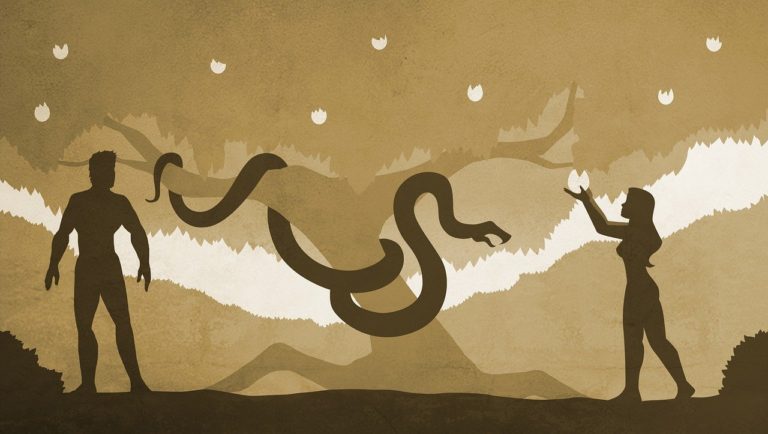The Old Testament
God said, Let us make man in our image, after our likeness: and let them have dominion over the fish of the sea, and over the fowl of the air, and over the cattle, and over all the earth, and over every creeping thing that creepeth upon the earth. Although the natural world is not itself fallen or disobedient to God, Adam’s sin brought the created order into bondage to death, decay, corruption, and futility. The background describes the curse on the ground due to the original human sin.
The Old Testament addressed them in Deuteronomy 14:2, “For you are a holy people to the Lord your God, and the Lord has chosen you to be a people for Himself, a special treasure above all the people who are on the face of the earth.” To be chosen not only meant to be favored, but it required responsible actions
God unconditionally elects certain people even though they are sinful as an act of his saving grace apart from the shortcomings or will of man. Those chosen have done nothing to deserve this grace.
God used many characters in the Bible to teach us about how God can use us even when we don’t think we’re qualified.
Most Christians believe that humanity’s purpose is to look after the world that God has created like caretakers (or stewards ) because creation belongs to God, not people. This is known as stewardship.
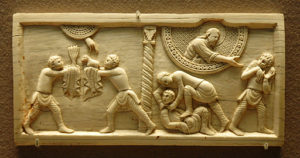
CREATION OF SINS
Genesis 2:4-3:24
Traditionally, the origin has been ascribed to the sin of the first man, Adam, who disobeyed God in eating the forbidden fruit (of knowledge of good and evil) and, in consequence, transmitted his sin and guilt by heredity to his descendants
Adam and Eve transmitted to their descendant’s human nature wounded by their own first sin and hence deprived of original holiness and justice; this deprivation is called “original sin”
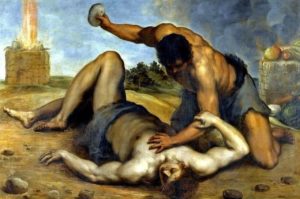
THE FIRST MURDER
Genesis 4:1-15
Abel, the first murder victim, is sometimes seen as the first martyr; while Cain, the first murderer, is sometimes seen as an ancestor of evil.
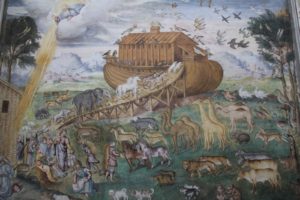
NOAH AND THE FLOOD
Genesis 6:1-9:17
Noah was thankful to God; he worshiped God; and acknowledged his need of God. The sacrifice he offered symbolized the sacrifice that Jesus would one day make for all the world, even for Noah. … But Noah didn’t congratulate himself. He honored and praised God because he knew he had found grace in the eyes of the LORD
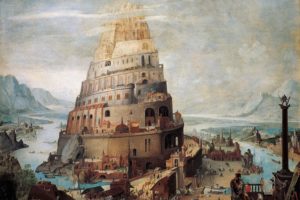
THE TOWER OF BABYLON ( BABEL )
Genesis 11:1-09
The Tower of Babel is an origin myth meant to explain why the world’s peoples speak different languages.
According to the story, a united human race in the generations following the Great Flood, speaking a single language and migrating eastward, comes to the land of Shinar. There they agree to build a city and a tower tall enough to reach heaven. God, observing their city and tower, confounds their speech so that they can no longer understand each other, and scatters them around the world.
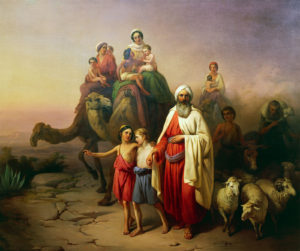
THE CALL OF ABRAHAM
Genesis 12:1-09
God called Abraham, a Shemite, to leave his homeland and his father’s house for a new country. He promised to bless Abram by making of him a great nation, one with a dynasty of kings, and to extend His blessing to all families on earth through Abraham.
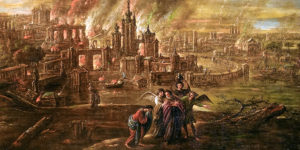
THE DESTRUCTION OF SODOM AND GOMORROH
Genesis 19:1-28
Sodom and Gomorrah, notoriously sinful cities, destroyed by “sulfur and fire” because of their wickedness
It is possible that the Bible’s story of the destruction of Sodom and Gomorrah combined collective memories about two events. Located in the Dead Sea region, Sodom and Gomorrah were most probably destroyed by a strong earthquake, Volcano, or a flood, but the fresh memory about two settlements perishing from a volcanic eruption caused the population to merge these two events. They presumably were devastated about 1900 BCE by an earthquake in the Dead Sea area of the East African Rift System, an extensive geologic rift extending southward from the Jordan River valley in Israel to the Zambezi River system in eastern Africa.
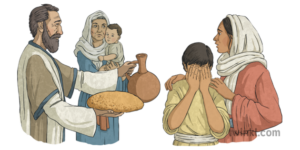
HAGAR AND ISHMAEL
Genesis 16:1-15, Genesis 21:9-21
Hagar, also spelled Agar, Abraham’s concubine and the mother of his son Ishmael. Purchased in Egypt, she served as a maid to Abraham’s childless wife, Sarah, who gave her to Abraham to conceive an heir.
Ishmael was born and brought up in Abraham’s household. Some 13 years later, however, Sarah conceived Isaac, with whom God established his covenant. Isaac became Abraham’s sole heir, and Ishmael and Hagar were banished to the desert, though God promised that Ishmael would raise up a great nation of his own.
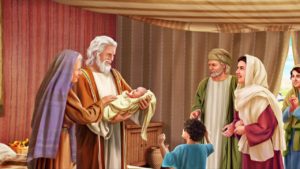
THE BIRTH OF ISAAC
Genesis 21:1-08
Although Sarah was past the age of childbearing, God promised Abraham and Sarah that they would have a son, and Isaac was born Later, to test Abraham’s obedience, God commanded Abraham to sacrifice the boy. Abraham made all the preparations for the ritual sacrifice, but God spared Isaac at the last moment.
Isaac is one of the three patriarchs of the Israelites and is an important figure in the Abrahamic religions, including Judaism, Christianity, and Islam. He was the son of Abraham and Sarah, the father of Jacob, and the grandfather of the twelve tribes of Israel.
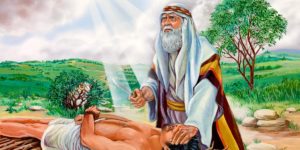
ABRAHAM’S OFFERING OF ISAAC
Genesis 22:1-19
According to the Hebrew Bible, God commands Abraham to offer his son Isaac as a sacrifice. After Isaac is bound to an altar, a messenger from God stops Abraham before the sacrifice finishes, saying “now I know you fear God.” Abraham looks up and sees a ram and sacrifices it instead of Isaac.
In faith, Abraham took his son Isaac and was ready to offer him up as a sacrifice, trusting that God could indeed raise him up again and fulfill His promises to Abraham to bless all nations through the Seed of Abraham and Isaac, Abraham received his son back again alive from the dead.
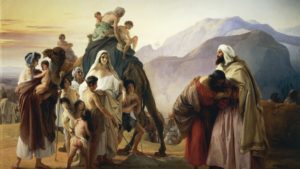
THE STORY OF JACOB
Genesis 25:19-35:19
Jacob was chosen by God before his birth, even before the foundation of the world, according to the foreknowledge of God. It was God’s desire to transform Jacob into His image, to deal with him until he was transformed into Israel, the prince of God. Along his journey Jacob received a special revelation from God; God promised Jacob lands and numerous offspring that would prove to be the blessing of the entire Earth. Jacob named the place where he received his vision Bethel (“House of God”).
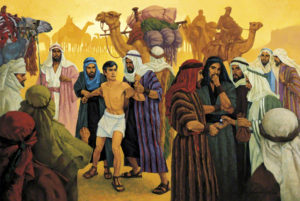
THE STORY OF JOSEPH
Genesis 37-50
Joseph was one of Jacob’s 12 sons. His father loved him more than any of the others and gave him a colored cloak. His brothers were jealous of him and sold him into slavery. He was taken to Egypt and eventually became a steward to Potiphar, one of Pharaoh’s officials. He brings all the resources of Egypt to make his family comfortable. He has become a sensitive, family-oriented man. We could understand the story as an illustration of how God works in the world. Dreams are a way to communicate with the Divine or a way to communicate with the deepest parts of ourselves.
Joseph’s “coat of many colors” was a representation of God’s “light of many colors.” It was a depiction of God’s glory found in the third heaven. It is God’s righteousness emanating from Him!
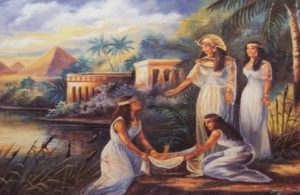
MOSES IN EGYPT
Exodus 1-14
Moses, also known as Moshe Rabbenu, is the most important prophet in Judaism, and an important prophet in Christianity, Islam, the Baháʼí Faith, and a number of other Abrahamic religions.
Moses led the Jews out of slavery in Egypt and led them to the Holy Land that God had promised them. The escape of the Jews from Egypt is remembered by Jews every year in the festival of Passover. The Jews were helped on their journey by God; the same God who’d promised Abraham that he would look after the Jews.
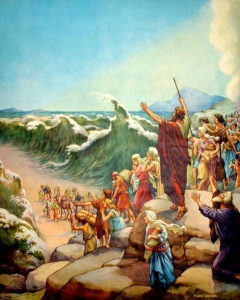
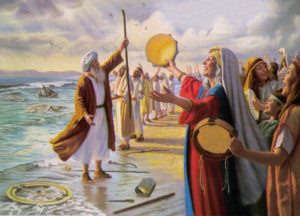
MOSES WILDERNESS WANDERINGS
Exodus 15:22-20:26, Exodus 31:18-34:35
Numbers 20:1-21:25
After the Ten Plagues, Moses led the Exodus of the Israelites out of Egypt and across the Red Sea, after which they based themselves at biblical Mount Sinai, where Moses received the Ten Commandments. After 40 years of wandering in the desert, Moses died within sight of the Promised Land on Mount Nebo.
Spies were sent by Moses to explore the land of Canaan (promised to the children of Israel) for “forty days”. The Hebrew people lived in the lands outside of the promised land for “forty years”. This period of years represents the time it takes for a new generation to arise.
The Pharaoh is a nervous man, outnumbered by his Hebrew slaves; he orders them to be worked harder, that doesn’t break their spirits, so he has all the newborn male babies killed; Moses’ parents, Amram and Jochebed, are desperate to save their baby son, and put him in a basket and send him down the river while his sister, Miram, follows to make sure he’s okay. The next morning, the Pharaoh’s daughter adopts and raises him as her own, with Jochebed as his nurse growing up. His playmate and uncle are Ramses, the Pharaoh’s son. As teens, they wrestle, but Ramses does not like Moses much, and Moses is exiled from town after Moses comes to the aid of a slave being beaten, and the beater is killed. Moses is mistaken for a Hebrew slave based on his appearance. His brother Aaron comes forward, revealing his past and how they are actually brothers-making Moses a Hebrew.
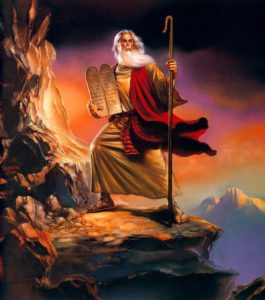
THE TEN COMMANDMENTS
Exodus 20:1-17
Deuteronomy 5:1-21
Ramses is now Pharaoh, God speaks to Moses, telling him to get the Hebrews from Egypt into the promised land. Ramses says no, the ten plagues come, and Ramses gives in only when his son is killed (as God’s spirit kills all the first-born Egyptian sons). Moses leads the people from Egypt, ditches Ramses and his army at the parting of the Red Sea, and Moses receives the Ten Commandments and delivers them to the Hebrews. Moses puts Joshua in charge of leading the people the rest of the way.
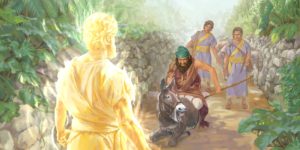
THE KING OF MOAB AND BALLAM
Numbers 22-24
Balaam, a non-Israelite prophet described in the Old Testament as a diviner who is importuned by Balak, the king of Moab, to place a malediction on the people of Israel, who are camped ominously on the plains of Moab.
Balaam was a pagan prophet; he worshiped the gods of the land. People believed that when Balaam cursed or blessed someone, it would be so. Balak, king of Moab, called on Balaam to curse the Israelites because he was afraid they would overtake him and his land.
